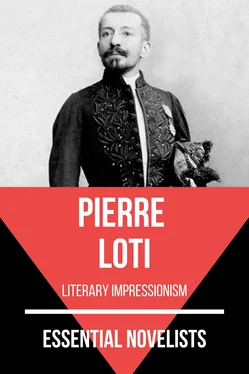1 ...8 9 10 12 13 14 ...18 With the exception of three or four ‘mousmes’ at the farther end, who are practising with bows and arrows, we are today the only people in the garden, and the mountain round about is silent.
Having finished her cigarette and her cup of tea, Chrysantheme also wishes to exert her skill; for archery is still held in honor among the young women.
The old man who keeps the range picks out for her his best arrows tipped with white and red feathers—and she takes aim with a serious air. The mark is a circle, traced in the middle of a picture on which is painted, in flat, gray tones, terrifying chimera flying through the clouds.
Chrysantheme is certainly an adroit markswoman, and we admire her as much as she expected.
Then Yves, who is usually clever at all games of skill, wishes to try his luck, and fails. It is amusing to see her, with her mincing ways and smiles, arrange with the tips of her little fingers the sailor’s broad hands, placing them on the bow and the string in order to teach him the proper manner. Never have they seemed to get on so well together, Yves and my doll, and I might even feel anxious, were I less sure of my good brother, and if, moreover, it was not a matter of perfect indifference to me.
In the stillness of the garden, amid the balmy peacefulness of these mountains, a loud noise suddenly startles us; a unique, powerful, terrible sound, which is prolonged in infinite metallic vibrations. It begins again, sounding more appalling: ‘Boum!’ borne to us by the rising wind.
“Nippon Kane!” exclaims Chrysantheme—and she again takes up her brightly feathered arrows. “Nippon Kane (‘the Japanese brass’); it is the Japanese brass that is sounding!” It is the monstrous gong of a monastery, situated in a suburb beneath us. It is powerful indeed, “the Japanese brass”! When the strokes are ended, when it is no longer heard, a vibration seems to linger among the suspended foliage, and a prolonged quiver runs through the air.
I am obliged to admit that Chrysantheme looks very charming shooting her arrows, her figure well bent back the better to bend her bow; her loose-hanging sleeves caught up to her shoulders, showing the graceful bare arms polished like amber and very much the same color. Each arrow whistles by with the rustle of a bird’s wing—then a short, sharp little blow is heard, the target is hit, always.
At nightfall, when Chrysantheme has gone up to Diou-djen-dji, we cross, Yves and I, the European concession, on our way to the ship, to take up our watch till the following day. The cosmopolitan quarter, exhaling an odor of absinthe, is dressed up with flags, and squibs are being fired off in honor of France. Long lines of djins pass by, dragging, as fast as their naked legs can carry them, the crew of the ‘Triomphante,’ who are shouting and fanning themselves. The Marseillaise is heard everywhere; English sailors are singing it, gutturally, with a dull and slow cadence like their own “God Save.” In all the American bars, grinding organs are hammering it with many an odious variation and flourish, in order to attract our men.
One amusing recollection comes back to me of that evening. On our return, we had by mistake turned into a street inhabited by a multitude of ladies of doubtful reputation. I can still see that big fellow Yves, struggling with a whole band of tiny little ‘mousmes’ of twelve or fifteen years of age, who barely reached up to his waist, and were pulling him by the sleeves, eager to lead him astray. Astonished and indignant, he repeated, as he extricated himself from their clutches, “Oh, this is too much!” so shocked was he at seeing such mere babies, so young, so tiny, already so brazen and shameless.
––––––––

CHAPTER XII. HAPPY FAMILIES!
––––––––

JULY 18TH.
By this time, four officers of my ship are married like myself, and inhabiting the slopes of the same suburb. This arrangement is quite an ordinary occurrence, and is brought about without difficulties, mystery, or danger, through the offices of the same M. Kangourou.
As a matter of course, we are on visiting terms with all these ladies.
First, there is our very merry neighbor Madame Campanule, who is little Charles N——-’s wife; then Madame Jonquille, who is even merrier than Campanule, like a young bird, and the daintiest fairy of them all; she has married X——-, a fair northerner who adores her; they are a lover-like and inseparable pair, the only one that will probably weep when the hour of parting comes. Then Sikou-San with Doctor Y——-; and lastly the midshipman Z———with the tiny Madame Touki-San, no taller than a boot: thirteen years old at the outside, and already a regular woman, full of her own importance, a petulant little gossip. In my childhood I was sometimes taken to the Learned Animals Theatre, and I remember a certain Madame de Pompadour, a principal role, filled by a gayly dressed old monkey; Touki-San reminds me of her.
In the evening, all these folk usually come and fetch us for a long processional walk with lighted lanterns. My wife, more serious, more melancholy, perhaps even more refined, and belonging, I fancy, to a higher class, tries when these friends come to us to play the part of the lady of the house. It is comical to see the entry of these ill-matched pairs, partners for a day, the ladies, with their disjointed bows, falling on all fours before Chrysantheme, the queen of the establishment. When we are all assembled, we set out, arm in arm, one behind another, and always carrying at the end of our short sticks little white or red paper lanterns; it is a pretty custom.
We are obliged to scramble down the kind of street, or rather goat’s-path, which leads to the Japanese Nagasaki—with the prospect, alas! of having to climb up again at night; clamber up all the steps, all the slippery slopes, stumble over all the stones, before we shall be able to get home, go to bed, and sleep. We make our descent in the darkness, under the branches, under the foliage, among dark gardens and venerable little houses that throw but a faint glimmer on the road; and when the moon is absent or clouded over, our lanterns are by no means unnecessary.
When at last we reach the bottom, suddenly, without transition, we find ourselves in the very heart of Nagasaki and its busy throng in a long illuminated street, where vociferating djins hurry along and thousands of paper lanterns swing and gleam in the wind. It is life and animation, after the peace of our silent suburb.
Here, decorum requires that we should separate from our wives. All five take hold of each others’ hands, like a batch of little girls out walking. We follow them with an air of indifference. Seen from behind, our dolls are really very dainty, with their back hair so tidily arranged, their tortoiseshell pins so coquettishly placed. They shuffle along, their high wooden clogs making an ugly sound, striving to walk with their toes turned in, according to the height of fashion and elegance. At every minute they burst out laughing.
Yes, seen from behind, they are very pretty; they have, like all Japanese women, the most lovely turn of the head. Moreover, they are very funny, thus drawn up in line. In speaking of them, we say: “Our little trained dogs,” and in truth they are singularly like them.
This great Nagasaki is the same from one end to another, with its numberless petroleum lamps burning, its many-colored lanterns flickering, and innumerable panting djins. Always the same narrow streets, lined on each side with the same low houses, built of paper and wood. Always the same shops, without glass windows, open to all the winds, equally rudimentary, whatever may be sold or made in them; whether they display the finest gold lacquer ware, the most marvellous china jars, or old worn-out pots and pans, dried fish, and ragged frippery. All the salesmen are seated on the ground in the midst of their valuable or trumpery merchandise, their legs bared nearly to the waist.
Читать дальше













